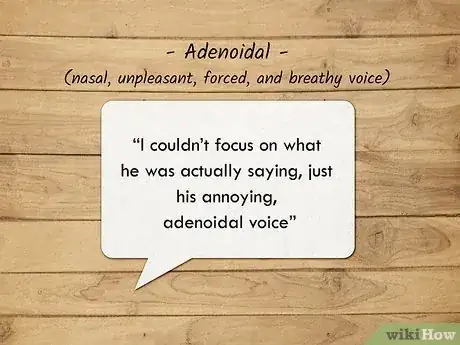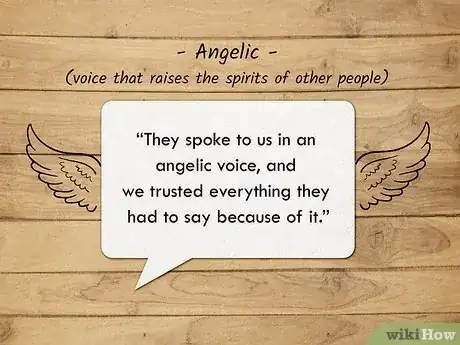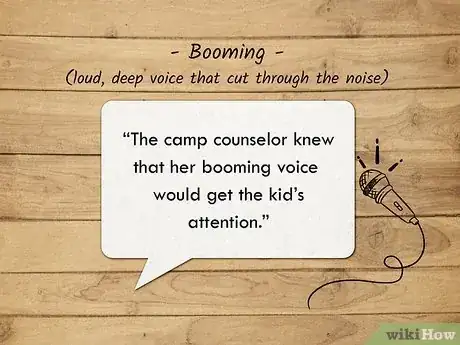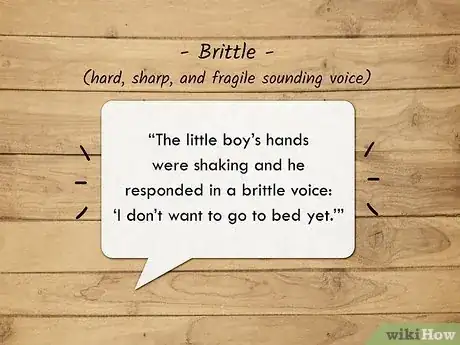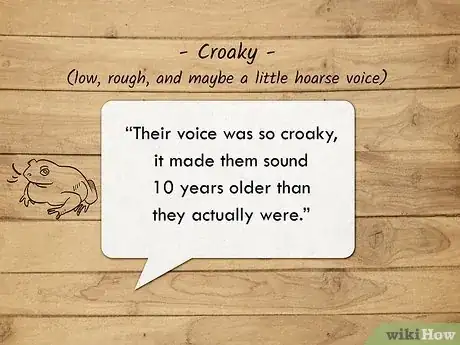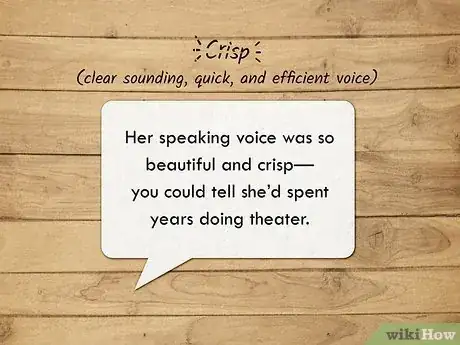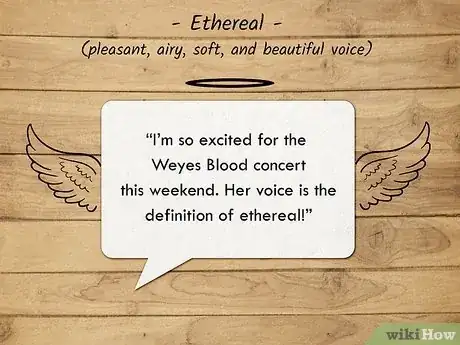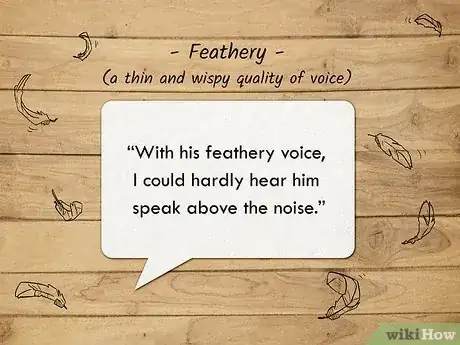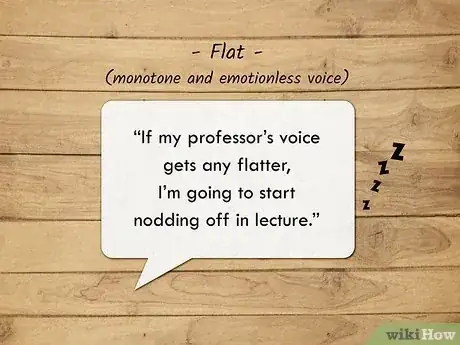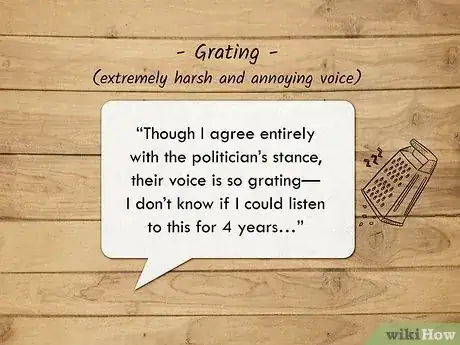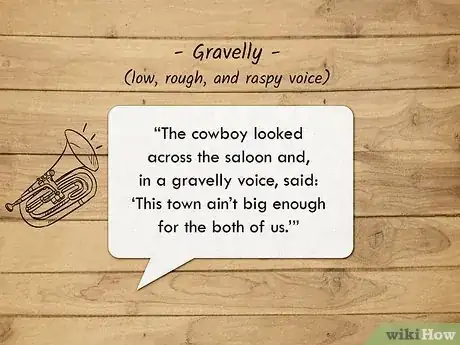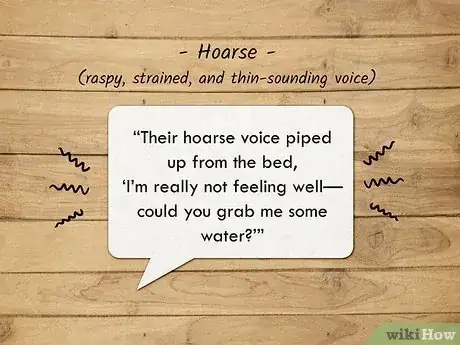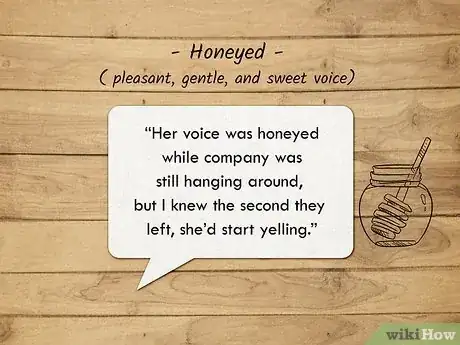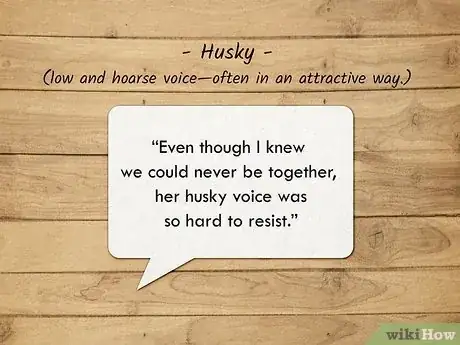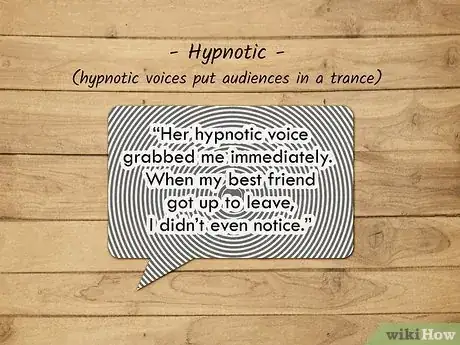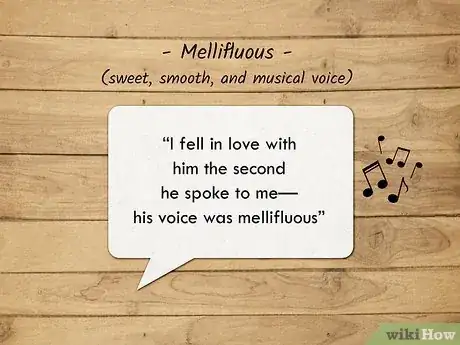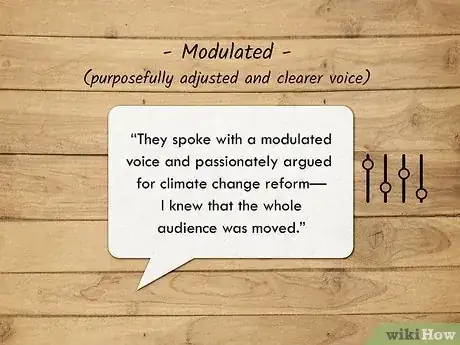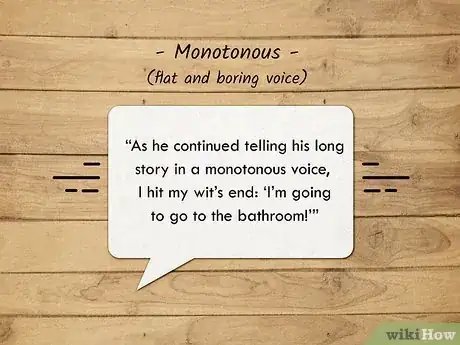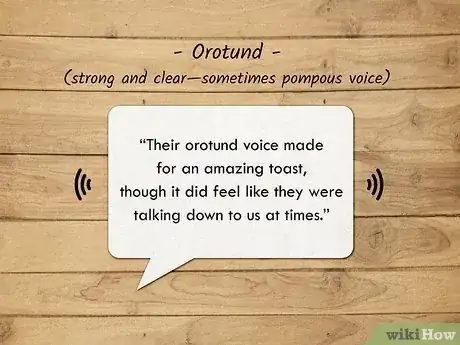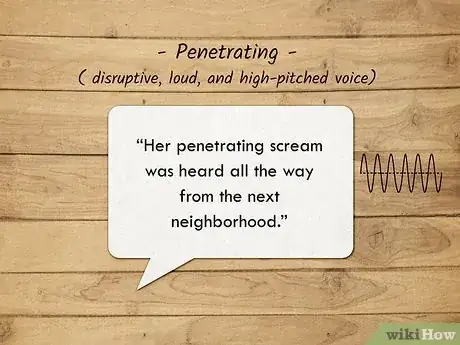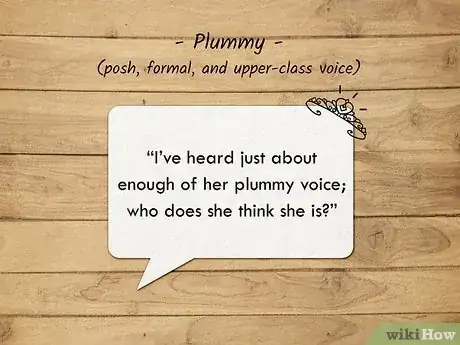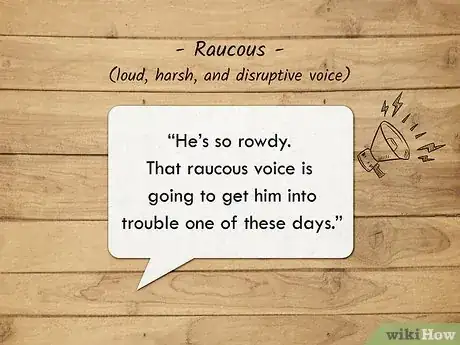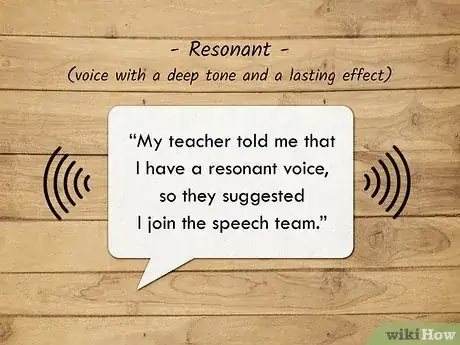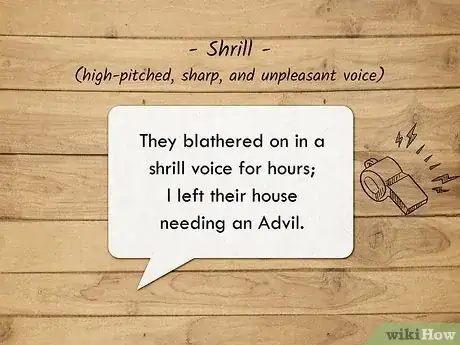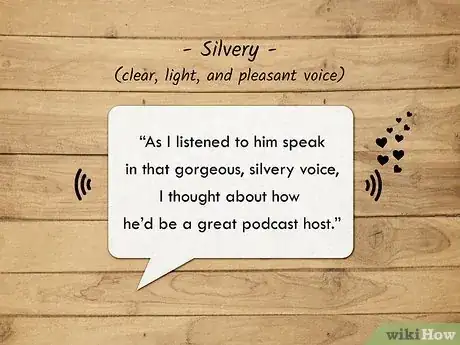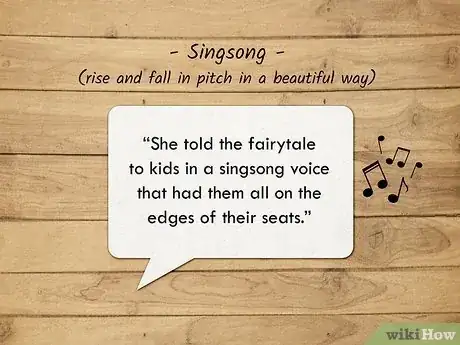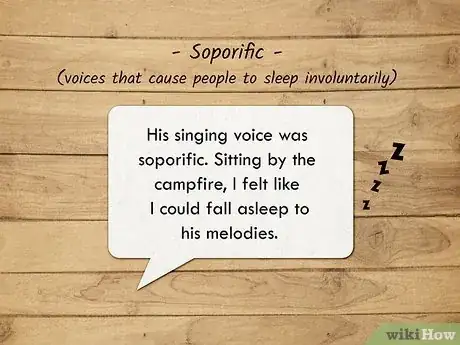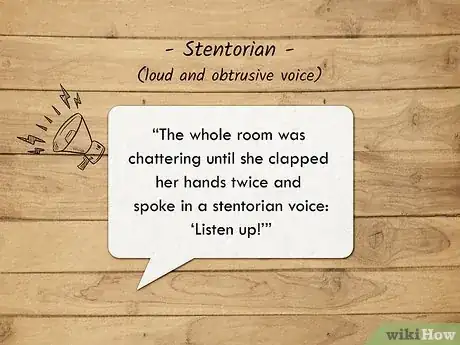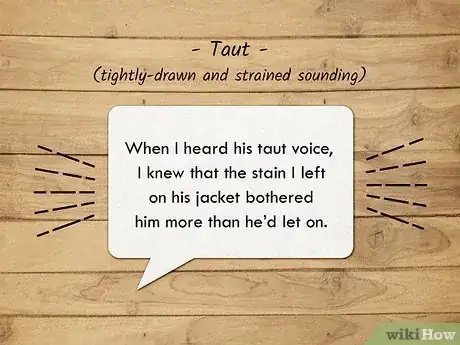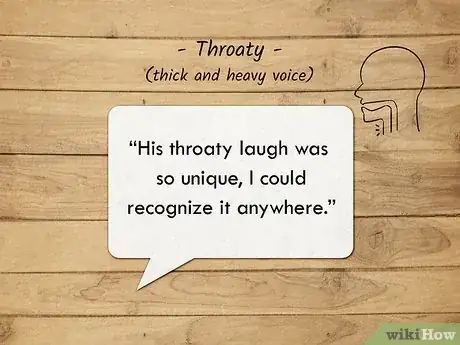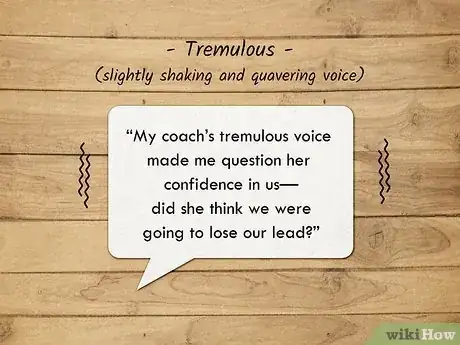This article was co-authored by wikiHow staff writer, Caroline Heiderscheit. Caroline Heiderscheit is a Staff Writer for wikiHow living in Santa Monica, CA. She has two years of experience working in content, including a year of editing work for first-time novelists. Caroline graduated from Stanford University in 2018 with degrees in American Studies and Creative Writing.
There are 26 references cited in this article, which can be found at the bottom of the page.
This article has been viewed 35,849 times.
Learn more...
The English language is chock-full of unique, exciting words to describe a person's voice. Whether you're discussing someone real or writing a fictional character, there's one word that perfectly describes the way they speak—and you'll find it listed below! We've also included definitions and examples to help you get started; so what are you waiting for? Enjoy our complete list of adjectives that describe a person's voice!
Things You Should Know
- Voices can be described by their volume. For example, "booming" and "feathery" are ways to describe loud and quiet voices.
- Some adjectives help describe a voice's tone and pitch; "monotone" and "shrill," for instance.
- You can also describe how someone's voice affects others. "Soporific" voices put people to sleep, and "hypnotic" voices hold them in a trance.
Steps
Adenoidal
-
Adenoidal voices are nasally, and mainly come through the nose. Use this to describe a voice that sounds unpleasant, forced, and breathy.[1] X Research source
- Example: “I couldn’t focus on what he was actually saying, just his annoying, adenoidal voice.”
Angelic
-
Angelic voices are thought to be inherently good and kind. This can reflect inherent qualities of the speaker; or, this can also be a voice that just naturally raises the spirits of people around them.[2] X Research source
- Example: “They spoke to us in an angelic voice, and we trusted everything they had to say because of it.”
Animated
-
Animated voices are lively and clearly show the speaker's feelings. Select this adjective when you’re describing someone excitable or in an engaging or intense conversation.[3] X Research source
- Example: “Listening to her animated voice, I knew she was really passionate about the topic at hand.”
Booming
Brittle
-
Brittle voices are hard, sharp, and fragile sounding. Use this to describe someone’s voice when they’re on the verge of tears.[4] X Research source
- Example: “The little boy’s hands were shaking and he responded in a brittle voice: 'I don’t want to go to bed yet.'"
Croaky
-
Croaky voices are low, rough, and maybe a little hoarse. People with croaky voices might sound like they have sandpaper in the back of their throats.[5] X Research source
- Example: “Their voice was so croaky, it made them sound 10 years older than they actually were.”
Crisp
-
Crisp voices are clear sounding, quick, and efficient. You might describe someone’s voice as “crisp” if they have excellent annunciation; or, on the other hand, you might use “crisp” for someone no-nonsense and to the point.[6] X Research source
- Example: “Her speaking voice was so beautiful and crisp—you could tell she’d spent years doing theater.”
- Example: “He gave the directions quickly in a crisp voice; he wasn’t messing around.”
Ethereal
-
Ethereal voices have a heavenly quality. This can mean different things to different people, but typically, ethereal voices are pleasant, airy, soft, and beautiful.[7] X Research source
- Example: “I’m so excited for the Weyes Blood concert this weekend. Her voice is the definition of ethereal!”
Feathery
-
Feathery voices are thin, soft, and airy. Use this to describe someone quiet, with a thin and wispy quality of voice.[8] X Research source
- Example: “With his feathery voice, I could hardly hear him speak above the noise.”
Flat
-
Flat voices are monotone and emotionless. Use this adjective to describe a boring voice that might just put its audience to sleep.[9] X Research source
- Example: “If my professor’s voice gets any flatter, I’m going to start nodding off in lecture.”
Grating
-
Grating voices are extremely harsh and annoying. Use this word for someone who’s like your alarm clock personified—they’re horrible to listen to.[10] X Research source
- Example: “Though I agree entirely with the politician’s stance, their voice is so grating—I don’t know if I could listen to this for 4 years…”
Gravelly
Hoarse
-
Hoarse voices are raspy, strained, and thin-sounding. Select this word to describe someone’s sick voice, for example. “Hoarse” is unlike “croaky” or “gravelly,” because it’s associated with quieter, weaker voices.[11] X Research source
- Example: “Their hoarse voice piped up from the bed, 'I’m really not feeling well—could you grab me some water?'”
Honeyed
-
Honeyed voices are pleasant, gentle, and sweet. Sometimes this word is also used to describe someone whose "kind" voice is insincere or phony.[12] X Research source
- Example: “Her voice was honeyed while company was still hanging around, but I knew the second they left, she’d start yelling.”
Husky
-
Husky voices are low and hoarse—often in an attractive way. Use this for someone whose lower, raspy voice gets them noticed by other people.[13] X Research source
- Example: “Even though I knew we could never be together, her husky voice was so hard to resist.”
Hypnotic
-
Hypnotic voices put audiences in a trance. For whatever reason, these voices completely grab the attention of their audience—it could be charisma, clear vocal quality, anything.[14] X Research source
- Example: “Her hypnotic voice grabbed me immediately. When my best friend got up to leave, I didn’t even notice.”
Mellifluous
-
Mellifluous voices are sweet, smooth, and musical. Use this word to describe someone’s voice if it’s noticeably pleasing to the ear.[15] X Research source
- Example: “I fell in love with him the second he spoke to me—his voice was mellifluous.”
Modulated
-
Modulated voices are purposefully adjusted, usually to be clearer. Use this word when a speaker thoughtfully tweaks their voice’s tone and tempo in an effort to sound pleasing or understandable.[16] X Research source
- Example: “They spoke with a modulated voice and passionately argued for climate change reform—I knew that the whole audience was moved.”
Monotonous
-
Monotonous voices are flat, meaning that they rarely vary in tone. Choose this word when you’re describing a voice that could belong to a robot—it’s so boring that listeners might find it annoying.
- Example: “As he continued telling his long story in a monotonous voice, I hit my wit's end: 'I’m going to go to the bathroom!'”
Orotund
-
Orotund voices are strong and clear—sometimes even pompous. Use this adjective when someone’s speaking voice is convincing, confident, and rich. It might even spill into overconfidence.[17] X Research source
- Example: “Their orotund voice made for an amazing toast, though it did feel like they were talking down to us at times.”
Penetrating
Plummy
-
Plummy voices sound posh, formal, and upper-class. Note that in most cases, “plummy” is used in a negative way, to poke fun at or criticize the speaker.[18] X Research source
- Example: “I’ve heard just about enough of her plummy voice; who does she think she is?”
Raucous
-
Raucous voices are loud, harsh, and disruptive. Use this description for someone whose voice hits high volumes, but is agitating.[19] X Research source
- Example: “He’s so rowdy. That raucous voice is going to get him into trouble one of these days.”
Resonant
-
Resonant voices have a deep tone and a lasting effect. Use this word to describe someone’s voice if it’s strong and hard to shake.[20] X Research source
- Example: “My teacher told me that I have a resonant voice, so they suggested I join the speech team.”
Shrill
-
Shrill voices are high-pitched, sharp, and at times, unpleasant. Use this word to describe someone’s voice that’s like a squeal or a squeak—it might make you want to cover your ears.[21] X Research source
- Example: “They blathered on in a shrill voice for hours; I left their house needing an Advil.”
Silvery
-
Silvery voices are clear, light, and pleasant. They might also have a slightly soft, high, or musical tone.[22] X Research source
- Example: “As I listened to him speak in that gorgeous, silvery voice, I thought about how he’d be a great podcast host.”
Singsong
Soporific
-
Soporific voices cause people to sleep involuntarily. This could be for any number of reasons. The person’s voice may be relaxing, boring, or warm—but if it causes people to nod off, it’s soporific.[23] X Research source
- Example: “His singing voice was soporific. Sitting by the campfire, I felt like I could fall asleep to his melodies.”
Stentorian
-
Stentorian voices are loud and obtrusive. Use this word when someone’s voice is booming and deep—some of the time, “stentorian” is used when a person’s voice is louder than it should be.[24] X Research source
- Example: “The whole room was chattering until she clapped her hands twice and spoke in a stentorian voice: 'Listen up!'”
Taut
-
Taut voices are tightly-drawn and strained sounding. Typically, a taut voice implies that someone is nervous, stressed, or angry.[25] X Research source
- Example: “When I heard his taut voice, I knew that the stain I left on his jacket bothered him more than he’d let on.”
Throaty
Tremulous
-
Tremulous voices are shaking slightly. Use this word to describe someone’s voice when it’s noticeably quavering, especially because of uncertainty or nerves.[26] X Research source
- Example: “My coach’s tremulous voice made me question her confidence in us—did she think we were going to lose our lead?”
Our Most Loved Articles & Quizzes
You Might Also Like
 How to React When Someone Blocks You
How to React When Someone Blocks You
 6 Ways to Respond to "What Are You Up To?"
6 Ways to Respond to "What Are You Up To?"

 What Does X Mean when Texting? From Warm Wishes to Playful Kisses
What Does X Mean when Texting? From Warm Wishes to Playful Kisses

 Short & Long Ways to Respond to “How Have You Been?”
Short & Long Ways to Respond to “How Have You Been?”
 13 Telltale Signs Someone Doesn't Respect You
13 Telltale Signs Someone Doesn't Respect You
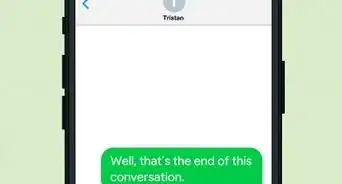

 Different Ways to Thank Someone for Contacting You
Different Ways to Thank Someone for Contacting You

 How to Invite a Girl over to Your House (Move a Date to Your Place)
How to Invite a Girl over to Your House (Move a Date to Your Place)

 What to Say When Someone’s Mom Dies
What to Say When Someone’s Mom Dies
References
- ↑ https://www.ldoceonline.com/dictionary/adenoidal
- ↑ https://www.collinsdictionary.com/us/dictionary/english/angelic-voice
- ↑ https://www.collinsdictionary.com/us/dictionary/english/animated
- ↑ https://www.collinsdictionary.com/us/dictionary/english/brittle
- ↑ https://www.collinsdictionary.com/us/dictionary/english/croaky-voice
- ↑ https://dictionary.cambridge.org/us/dictionary/english/crisp
- ↑ https://www.merriam-webster.com/dictionary/ethereal
- ↑ https://www.collinsdictionary.com/us/dictionary/english/feathery
- ↑ http://vocularapp.com/monotone-voice-myth/
- ↑ https://www.vocabulary.com/dictionary/grating
- ↑ https://www.nidcd.nih.gov/health/hoarseness
- ↑ https://www.merriam-webster.com/dictionary/honeyed
- ↑ https://dictionary.cambridge.org/us/dictionary/english/husky
- ↑ https://www.ldoceonline.com/dictionary/hypnotic
- ↑ https://www.vocabulary.com/dictionary/mellifluous
- ↑ https://www.collinsdictionary.com/us/dictionary/english/modulate
- ↑ https://www.dictionary.com/browse/orotund
- ↑ https://www.collinsdictionary.com/us/dictionary/english/plummy
- ↑ https://www.merriam-webster.com/dictionary/raucous
- ↑ https://www.vocabulary.com/dictionary/resonance
- ↑ https://www.vocabulary.com/dictionary/shrill
- ↑ https://www.merriam-webster.com/dictionary/silvery
- ↑ https://www.wineverygame.com/words/soporific.html
- ↑ https://www.vocabulary.com/dictionary/stentorian
- ↑ https://www.oxfordlearnersdictionaries.com/us/definition/english/taut
- ↑ https://www.oxfordlearnersdictionaries.com/us/definition/american_english/tremulous
About This Article

